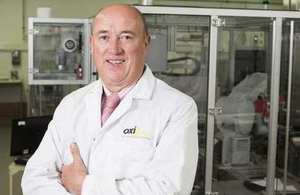Success story: safer, more efficient battery powers growth
Innovate UK support for breakthrough technology in lithium-sulfur battery cells helps open up multiple market opportunities for OXIS Energy.

Chief executive Huw Hampson-Jones: "We will be producing cells in their millions."
When OXIS Energy first won funding from Innovate UK to develop a ground-breaking rechargeable battery cell their staff numbers were barely into double figures.
That was in 2009 when the idea was at prototype stage. Six years later, numbers at their Culham Science Centre HQ near Abingdon have risen to nearly 60 – mostly post-doctoral qualified scientists and highly skilled technical staff.
The marketplace is now waking up to OXIS and its novel lithium-sulfur (Li-S) technology.
Innovate UK is currently investing £850,000 in helping the company develop a Revolutionary Electric Vehicle Battery (REVB).
OXIS Energy creating lighter, more efficient batteries
Not only are European car manufacturers showing interest but there are clear cross-overs into other markets such as aerospace, defence, energy storage and marine vessels, where Innovate UK is funding an autonomous submarine project.
Employment growth at OXIS is mirrored in development of the lithium-sulfur battery cell itself, particularly a 20-fold improvement in capacity.
A major advantage is that OXIS’s Li-S cells have been proven in penetration, overcharging and short-circuit performance tests to be safer than the more volatile lithium-ion technology that has dominated the market for two decades or more.
It is one of the main reasons why OXIS was chosen to provide batteries for the GATEway driverless vehicle project in Greenwich.
Cheaper to produce
The OXIS battery cell is also not only lighter and more efficient, it is cheaper to produce and has less environmental impact because the active materials do not include rare earth metals.
Chief executive Huw Hampson-Jones said:
That pioneering work is a direct result of Innovate UK funding. What Innovate UK has done is give us the scientific momentum to prove that lithium-sulfur is the breakthrough technology required. It has also allowed us to put ourselves in a position where we can export British innovation across the world.
Chief technology officer David Ainsworth added: “Innovate UK is also allowing us to look outside the box for lithium-sulfur technology, to applications we hadn’t previously considered.”
The sheer quality of the science and knowledge generated by the people at OXIS is reflected in the wealth of patents granted to the company – 64 at the last count.
Huw said: “We have 55 pending and 21 patent families outstanding. In the last three years alone we have filed 12 new patent families. One European car manufacturer has been quite clear that they are collaborating with us on a new electric vehicle battery system primarily on the strength of our IP.”
Year-on-year growth
He points to consistent year-on-year growth in revenues since 2010 and predicts the same for the next five years, adding:
By then I believe we will be a highly respected company with tens of millions of pounds of turnover in the UK.
In October 2012, a deal with SASOL, the South African energy and chemicals group, not only brought in £15 million in cash but also technical expertise and free access to SASOL’s research facilities in the UK. Huw added:
Recently, we raised a further £7 million, again from private British investors who believe in the technology. We haven’t been so successful with institutional investors in London. I think it’s partly because they don’t understand the longevity required to develop innovative chemistry for safe use in a world market.
The investments will see a further increase in employment levels as OXIS moves into mass-production of battery cells, which would require another plant in the UK, or in Europe.
Huw said: “Five years from now, we will be producing cells in their millions.”
Learn more about about the best of British automotive innovation at CENEX LCV 2015. This year’s show is convening the UK’s next generation of low carbon, intelligent vehicles and the British-based technology bringing them to life.